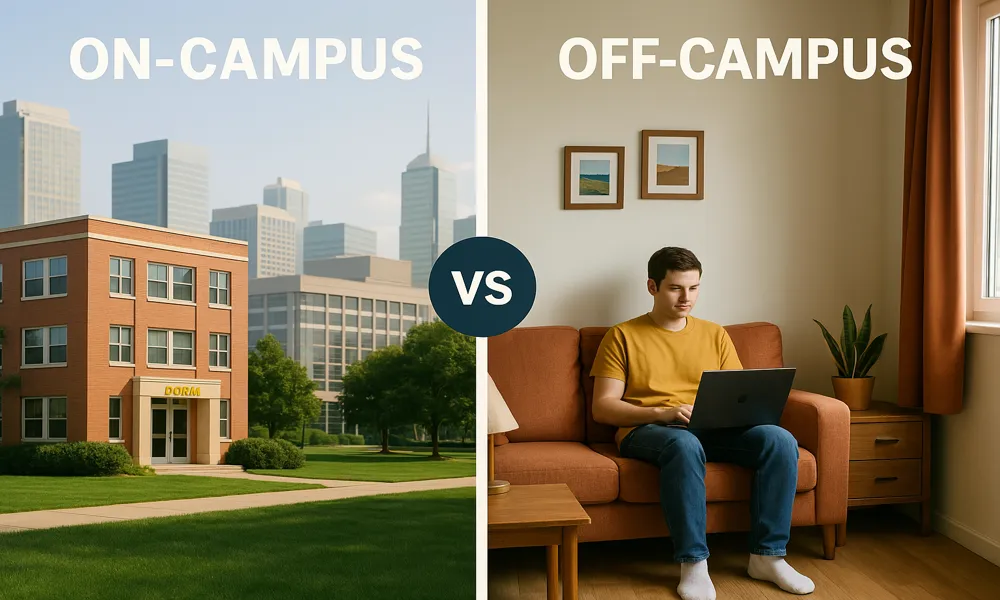On-Campus vs Off-Campus Accommodation: Which is Better for Students in 2025?
Table of Contents
Choosing the right place to live while studying abroad can be just as important as picking your university. Whether you go for the convenience of living on campus or the flexibility of off-campus student housing, each option comes with its own set of perks and trade-offs. In 2025, over 65% of international students are opting for off-campus options due to enhanced privacy and modern amenities, but on-campus living still remains a top choice for first year and international students. Let’s dive into the major differences between the two and help you figure out which one works best for your student lifestyle.
What Is the Difference Between On-Campus and Off-Campus Accommodation?
The difference between on-campus and off-campus accommodation is all about who provides the housing, what’s included, and how much flexibility you get. On-campus accommodation is owned and managed by the university and usually located within walking distance of classes, libraries, and campus facilities. On the other hand, off-campus accommodation is provided by private landlords or student housing companies and is typically located outside university grounds. Here’s a quick comparison to help you understand the difference better:
| Feature | On-Campus Accommodation | Off-Campus Accommodation |
| Managed by | University or college | Private landlords or housing providers |
| Location | Within or very close to campus | Nearby neighborhoods or city suburbs |
| Lease Type | Fixed (aligned with academic year or semester) | Flexible (monthly, 6-month, or annual lease options) |
| Utilities Included | Usually included in rent (Wi-Fi, electricity, water, etc.) | Sometimes included; often paid separately |
| Amenities | Basic (laundry, study lounges, cafeteria) | Advanced (gym, pool, game room, Wi-Fi, in-unit laundry) |
| Privacy | Shared rooms or dorm-style living | Private rooms, en-suites, or studios available |
| Security | 24/7 campus security and staff support | Varies – many off-campus student apartments have gated access |
| Best Suited For | First-year, exchange, or international students seeking structure | Students who value independence, space, and customizable budgets |
Is On-Campus Accommodation More Expensive Than Off-Campus Housing?
The cost comparison between on-campus and off-campus accommodation really comes down to what’s included and how you prefer to live. On the surface, on-campus housing might seem more affordable because it typically bundles rent, Wi-Fi, utilities, and sometimes even meal plans into one single payment. Meanwhile, off-campus housing offers a wider range of pricing options.
Yes, the base rent might be higher depending on the city, but you gain control over your lifestyle. You can choose to live with roommates, cook your own meals, or even pick a place that includes gym access or study lounges. Below is a detailed breakdown to help you compare costs between on campus and off campus accommodation:
| Accommodation Type | Average Monthly Cost (USD) | What’s Usually Included |
| On-Campus Housing | $600 – $1,200 | Rent, internet, utilities, laundry access, security, meal plan (in some cases) |
| Off-Campus Housing | $800 – $1,500 | Rent, sometimes includes utilities and Wi-Fi |
| Studio Apartment (Off-Campus) | $1,200 – $1,800 | Private kitchen/bathroom, bills may vary |
| Shared Room (Off-Campus) | $500 – $1,000 | Shared kitchen/bathroom, bills often split among roommates |
What Are the Pros and Cons of On-Campus Student Accommodation?
On-campus student accommodation is often the go-to option for first year and international students, and for good reason. It’s designed to help students settle into university life quickly with easy access to academic buildings, libraries, dining halls, and social spaces—all within walking distance. But just like any housing option, it comes with both advantages and a few trade-offs. Below are the pros and cons of on-campus student accommodation:
Pros of On-Campus Accommodation
- Proximity to Campus: You’re just minutes away from your lectures, labs, libraries, and academic advisors. No commuting means more time to study, rest, or join campus activities.
- All-Inclusive Living: Most university accommodations come with bundled rent, utility bills, internet, and sometimes even meal plans—so budgeting becomes simpler.
- Safe and Secure: 24/7 campus security, access control systems, and on-site residential advisors make it one of the safest living options.
Cons of On-Campus Accommodation
- Limited Privacy: Shared rooms or bathrooms are common, which might not be ideal if you value personal space.
- Less Flexibility: University housing typically follows academic calendars, meaning lease terms are fixed and you may need to move out during breaks.
- Limited Variety: Room types and amenities might be basic compared to off-campus housing or PBSAs.
What Is HMO Property? A Complete Guide to Houses in Multiple Occupation
Why PBSAs Are the Best Student Housing Option in 2025?
What Are the Advantages and Disadvantages of Off-Campus Housing for Students?
Off-campus student housing is becoming increasingly popular among students, especially upper-year, international, and postgraduate students. Whether you’re looking for a studio with privacy or a shared flat with friends, off-campus options offer more variety, control, and flexibility than most on-campus dorms. But before making the move, it’s important to weigh the off campus student housing pros and cons to see if it aligns with your lifestyle and academic goals:
Pros of Off-Campus Housing
- More Privacy and Space: From en-suite rooms to entire studio apartments, off-campus housing gives students a private, comfortable living space—ideal for focused study or relaxation.
- Greater Freedom: You get to choose your roommates, the neighbourhood, and even your rent range. This freedom is especially valued by students who enjoy independence or are living with friends.
- Flexible Lease Terms: Unlike on-campus leases tied to academic calendars, off-campus contracts can be monthly, semester-based, or year-long—offering more control over your stay.
- Modern Amenities: Many Purpose-Built Student Accommodations (PBSAs) include gyms, game rooms, co-working spaces, laundry facilities, and rooftop lounges.
Cons of Off-Campus Housing
- Distance from Campus: Most off-campus housing is not within walking distance. You may need to rely on public transport, cycling, or drive to class daily.
- Bills Not Always Included: Unlike most university housing, off-campus accommodation may require separate payments for electricity, internet, water, and heating.
- More Responsibilities: You’ll need to manage your own meals, cleaning, and minor maintenance issues—there’s no resident assistant or housing staff to help with daily chores.
- Less Social for First-Years: If you’re new to university life, living off campus might feel isolating since you’re not immersed in the campus community or spontaneous student events.
How to Decide Between On-Campus and Off-Campus Accommodation in 2025?
Your choice should depend on your personal preferences, lifestyle, and budget. Are you someone who thrives in social environments and prefers everything within walking distance? Then on-campus living might be your thing. Do you value independence, want to cook your own meals, or prefer more modern amenities? Then off-campus accommodation could be a better fit.
| Factor | Choose On-Campus If… | Choose Off-Campus If… |
| You’re a first-year/international student | Yes | Maybe not |
| You want privacy and flexibility | Limited | Highly flexible |
| You prefer structured living with meals | Yes | Not included |
| You’re on a tight budget | Shared dorms are cheaper | Shared off-campus rooms save money |
| You like managing your own space | Restrictions apply | You’re in charge |
Conclusion
Both on-campus and off-campus accommodation come with their own set of perks, and neither is universally “better” than the other—it really comes down to what matters most to you. If you want convenience and community, on-campus might be your best choice. But if you’re after independence, flexibility, and modern amenities, then off campus student housing is a top contender.
Still confused? University Living is here to help! With verified student housing options across 400+ cities worldwide, we make it easy to compare, shortlist, and book the perfect accommodation—whether on campus or off. Talk to our experts today and get 24/7 support, virtual tours, and exclusive deals on the best student accommodations in 2025!
Frequently Asked Questions
Is on-campus accommodation more expensive than off-campus housing?
It depends on your location and lifestyle. In many cases, on-campus accommodation may appear cheaper because utilities and even meal plans are bundled into the rent. However, off-campus student housing often offers more flexibility in room choices and lets you split bills with roommates or choose cost-saving options—sometimes making it more affordable in the long run.
What are the benefits of on-campus accommodation for students?
The biggest benefits of on-campus accommodation for students include proximity to classes, built-in meal plans, 24/7 security, and a strong sense of campus community. It’s a hassle-free option especially for first-year or international students who want everything in one place and less responsibility managing utilities, rent, or transport.
What are the pros and cons of off-campus student housing?
The main pros of off-campus student housing include more privacy, modern amenities, freedom to choose your location and roommates, and flexible lease lengths. The downsides can be commuting to campus, handling utility payments separately, and being more responsible for daily chores and meals. It’s perfect for upper-year or postgraduate students who value independence.
How much does on-campus vs off-campus accommodation cost?
On average, on-campus housing costs $600 – $1,200 per month, including utilities and sometimes meal plans. Off-campus housing ranges from $800 – $1,500/month, depending on the location and room type. Shared rooms or renting with friends can significantly reduce off-campus costs.
Can I switch from on-campus to off-campus housing mid-year?
Yes, many universities and housing platforms like University Living allow students to transition from on-campus to off-campus housing depending on availability and lease terms. It’s best to plan ahead and consult with your university or a student housing expert for smooth relocation.
How can University Living help me find the right accommodation?
University Living is a global student housing platform that helps you compare and book the best verified student accommodations in over 400 cities. Whether you’re choosing between on campus vs off campus options, we offer 24/7 expert guidance, virtual tours, and exclusive discounts. Our mission? A stress-free move-in experience tailored just for you.








